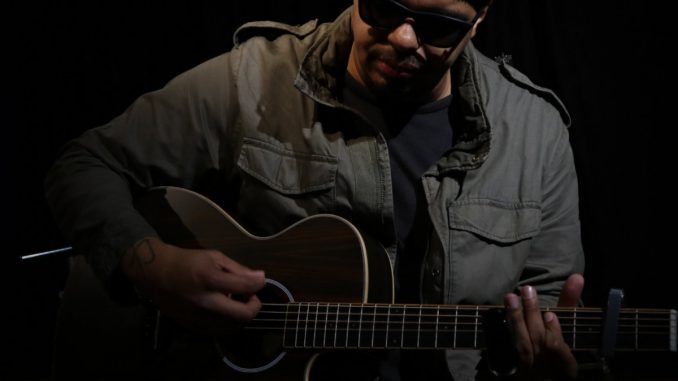
It is with songs from the ancestor of jazz that the forty-year-old Moroccan-Canadian expresses himself. His new recording “Desert” (to be released on April 1st), is an expedition towards the cosmic, a waking dream, an alienation of the senses through emotion. We are invited to smell the odors of a musical kitchen with south-south ingredients which does not fear the innovation.
Various universes, all carried by the blues, tickle or caress the buried. Like an indomitable lion, Othman Wahabi uses unsuspected roars. A language that he shares with guests who do not necessarily speak the same musical phrasing but who know how to mix them until intoxication. A 14-track album where the spiritual is the eternal guide. The journey opens in Arabic on “Daoui ya Guamra” that we are tempted to assimilate to the creations of the excellent Aziz Sahmaoui, leader of University of Gnawa. Continuing to listen, in addition to strong black American influences, there is Dr. John who comes here and there to flirt with the ear.
The album is otherwise dotted with heartfelt featurings. On “Blues for Farka”, a tribute to the great Malian musician and composer Ali Farka Touré, the Guinean Mandingo Oumar Kouyaté launches (in the intro) into a verbal tirade in which he claims that the blues belongs to Africa by quoting John Lee Hooker.
Further on, “Gnaoua Blues” combines Othman’s guitar and warm voice with the formidable aerial ritornellos of Portuguese trumpeter Joao Sousa. Another register, another tribute: “David Diop’s Africa” celebrates the legendary Senegalese poet. In this “Desert”, there is also a wink to Muddy Waters and the cover of “The Sky is Criying”, spiritual, tinged with reggae. And then, there is behind the harmonicist Vincent Bucher on “By the River” the shadow of the thundering Sugar Blue, the man who pointed the French musician. In short, this new opus of Othman Wahabi is a condensed deep reflection soaked in a free maturity.
The artist from Casablanca starts his career with a bang. The music by the rage, by strident sounds, by the claim all-azimuths. And then, it is the lull. As a teenager, Othman Wahabi starts by hitting the punk-rock and trash metal streets. With a friend, he created the band Keops, a heavy rock formation.
Having had enough of living on a background of disagreements, Othman slams the door, remembering that another door is still ajar, that of his childhood, that of distant memories, that of a father mad about the blues. He remembers those sweet moments and understands that creative happiness can come from the pain that a style can suggest.
He leaves Morocco in 2005, destination Canada, Montreal where he gets a degree in hotel and tourism management. The founding member of garage blues rock outfit Othman Wahabi & The Blues Punk Machine and Moroccan alternative punk project Ranging Indigenous covers the standard “Catfish Blues” by the legendary Robert Petway
in 2013.
On YouTube, this first try collects more than a million views. Othman then intends to make himself even more heard by continuing his exploration in the shackles of American blues rock, then in the blues of the roots and finally in the questioning of the memory of his country of origin and Africa that contains it. He recorded six albums including “Black Soul” (2018), “Blues Night Tripper” (2019), “Zagora ” (2019), “The Blues Whisperer” (2021), and finally the new and upcoming, the throbbing and vigorous “Desert”.
Guitarist/multi-instrumentalist/composer and producer, Othman Wahabi does not really have a choice: when he moves away from Gnaoua music, it always ends up catching up with him even though he administers mixtures engraved in the most flamboyant of crossbreedings. This appeals to the British Blues Matters Magazine and the BBC. It is welcomed on the columns of the first and the waves of the second with a “constructive” curiosity.
Listening to Othman’s creations, one understands better why he cites as a platform of influences artists that only the term music unites: Ry Cooder, Majid Bekkas, Peter Tosh, Nass El Ghiwane, John Lee Hooker, Ali Farka Touré, Chris Rea, Tinariwen, Carlos Santana, Hassan Hakmoun… And when the result is engraved in fluidity, we ask for more.

Be the first to comment